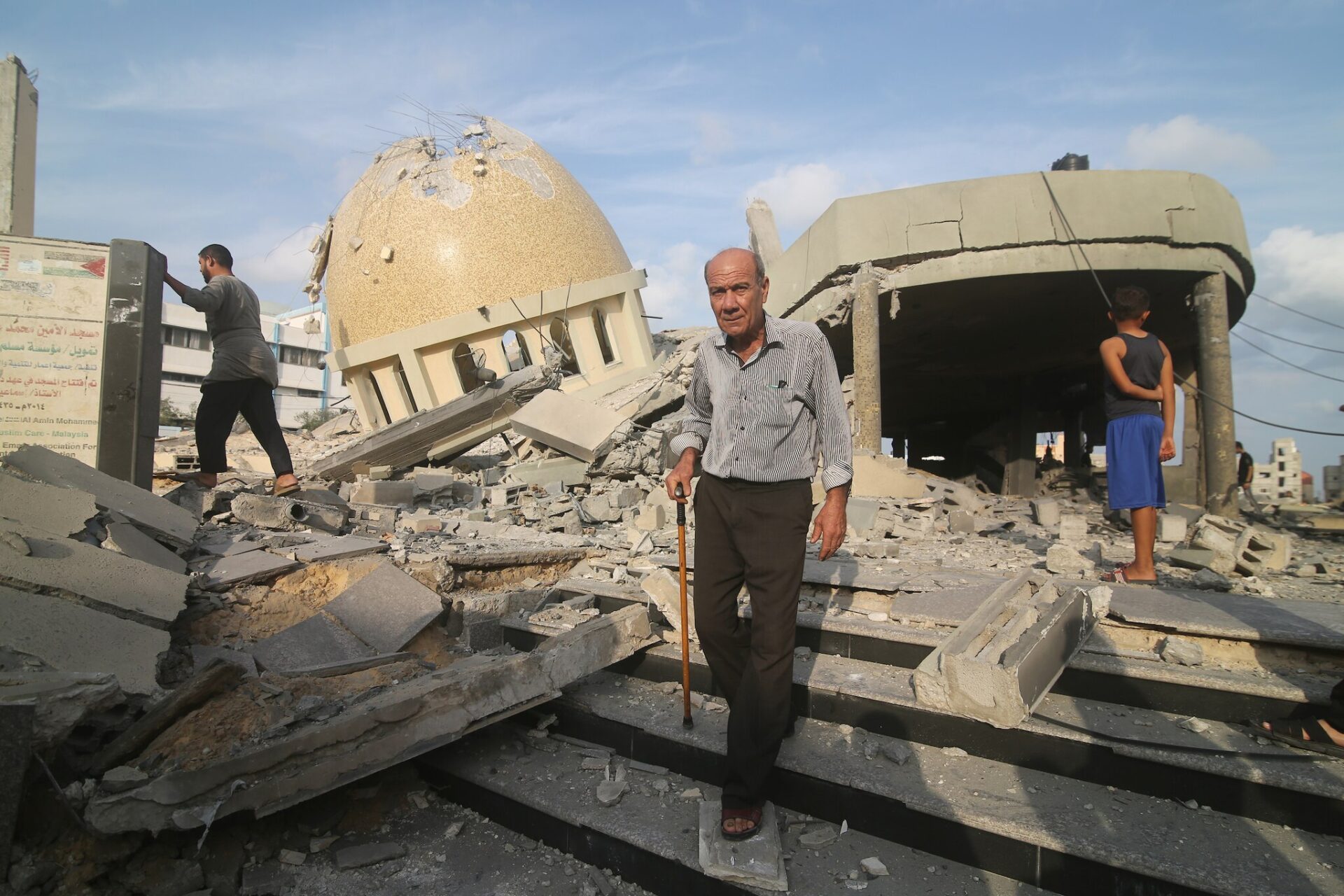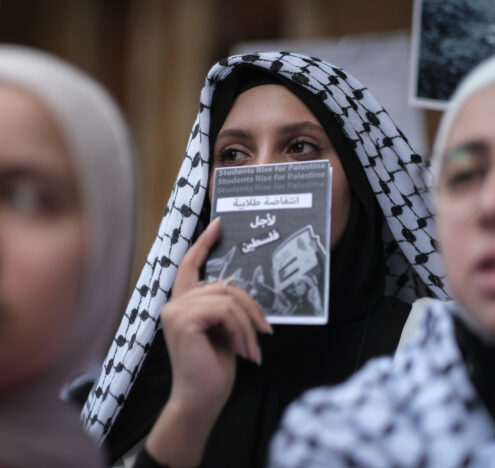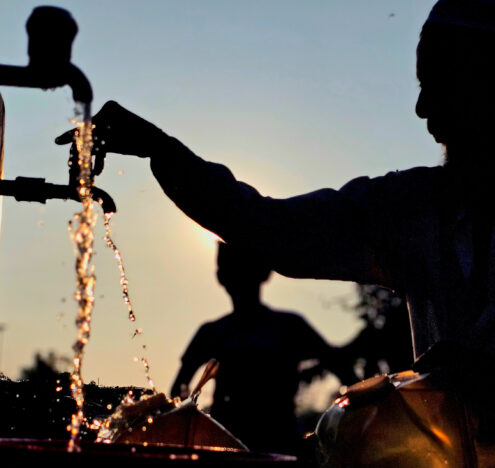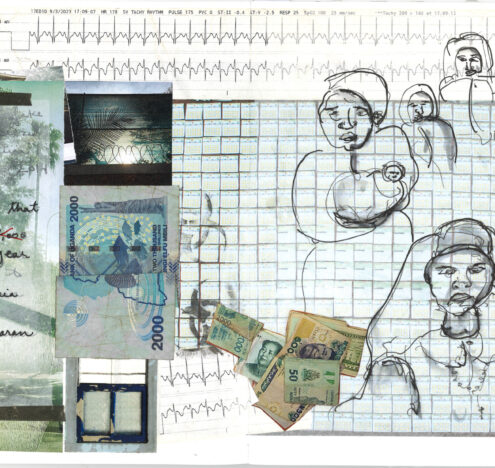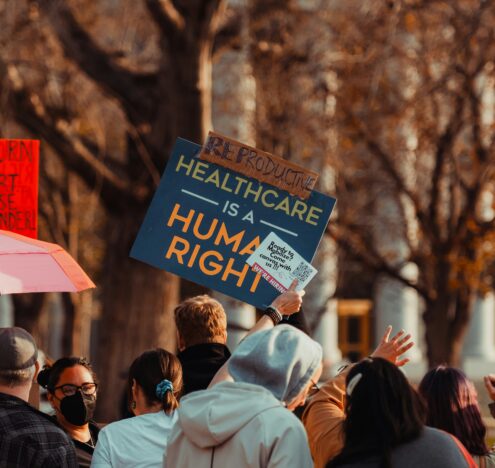Makeshift tents extend as far as the eye can see in the desert landscape of Rafah, the southernmost province of the Gaza Strip where more than half of Gaza’s population is now living, after fleeing Israeli airstrikes.
“Where do we go in Rafah?” Abdul Karim al-Shami, an exasperated father of eight tells an NBC reporter. “Is Rafah safe? There is more shelling in Rafah than Khan Younis these days.”
Over the past three months, Israel’s assault on the Gaza Strip has killed more than 23,000 people and displaced almost two million — around 85% of Gaza’s population. As the Israeli military pushes southwards, Gazans — many of whom have already been displaced, once, twice, and now even three or four times — are forced to flee to Rafah, the last district in Gaza before the Egyptian border.
“People are trapped,” says Samah Hadid, the Norwegian Refugee Council’s Head of Advocacy, Media and Communications for the Middle East, adding that, at this point, nowhere is safe in Gaza. “They’re unable to go back to their homes, and they’re unable to leave Gaza.”
Unlike the Syrians who crossed the borders into Turkey and Lebanon to flee Bashar al-Assad’s civil war, or the Ukrainians who sought safety from Russia’s full-scale invasion in countries like Poland, Romania, and Belarus, very few Palestinians displaced by Israel’s assault on Gaza have been able to seek refuge by crossing international borders.
The reason for this is twofold.
First, it has long been complicated to leave the Gaza Strip, which has been under an Israeli blockade since 2007. Even before the war, for a Palestinian living in Gaza to cross the border into Egypt, they needed to get permission from Hamas and the Egyptian authorities, and to cross the Erez border into Israel they needed an exit permit from Israeli authorities. Since the most recent conflict started, Israel has intensified its siege on Gaza, halting supplies of food, water, fuel, and electricity from entering the enclave, and the Erez closing has been shut, indefinitely, further trapping people inside Gaza. Human rights advocates have compared the strip to an open-air prison.
Second, many fear that leaving Gaza now could lead to permanent mass displacement that undermines the future of a Palestinian state.
A Traumatic History of Displacement
“Opening the border seems like the most protective thing to do,” Nadia Hardman, a researcher in the Refugee and Human Rights division of Human Rights Watch, told Inkstick, adding that this has facilitated safe passage in other conflicts, such as Syria and Ukraine, among others. “However, in the Palestinian context, it could risk another Nakba.”
Many have already drawn comparisons between the mass displacement seen over the past three months in Gaza and the Nakba, the period of 1948 when Zionist militias stormed Palestinian cities and villages, pushing people off their land to establish the state of Israel. At the time, many fled across the borders into neighboring countries like Egypt, Lebanon, Jordan, and Syria, expecting that they would return home after the violence subsided.
“Our fear is that Israel, through its ongoing siege and the indiscriminate bombardment and destruction of Gaza, has made Gaza unlivable. We are afraid that it could force people to move across borders without any guarantee of return or safety.”
Samah Hadid
Seventy-five years later, very few have had the chance to return. Instead, the hundreds of thousands who fled lived out their lives in exile, often marginalized and discriminated against for being Palestinian throughout their lives. In countries like Lebanon, even the children and, in some cases, grandchildren of Palestinian refugees are born without the same rights as Lebanese citizens.
“Our fear is that Israel, through its ongoing siege and the indiscriminate bombardment and destruction of Gaza, has made Gaza unlivable,” Hadid added. “We are afraid that it could force people to move across borders without any guarantee of return or safety.”
Israeli politicians, such as far-right Minister of National Security Itamar Ben-Gvir, are already promoting “voluntary emigration” as a solution for Palestinians to be safe from bombardment — and some have suggested that Egypt’s Sinai Peninsula could be a refuge for Palestinians who once lived in Gaza, evoking memories of displaced Palestinians in Jordan after the Nakba.
“Of course, Palestinians who are facing mass atrocities should be given safe passage to seek shelter and safety,” Hadid said. She noted that it is difficult to assess whether or not migrating is voluntary now, when Israel has destroyed so many civilian areas and left many homeless.
Nowhere To Turn
Even if Palestinians wanted to leave Gaza — and were granted the necessary permissions to do so legally — very few countries have offered to facilitate safe passage, and even fewer have offered to protect refugees in the long term.
While Australia has facilitated emergency evacuations for both Australian citizens and their immediate relatives (and the Canadian government is trying to facilitate a similar scheme), many countries have explicitly introduced immigration restrictions for Palestinians and even gone so far as to crack down on Palestinians already living in the country.
The Netherlands has suspended asylum procedures for Palestinians from both Gaza and the West Bank for the next six months for “security” reasons.
A handful of US representatives have introduced measures that would bar Palestinians from traveling to the United States, including the “Safeguarding Americans From Extremism Act,” which would pause all visas, refugee, and asylum procedures in process since Oct. 1, 2023, for anyone holding a passport from the Palestinian Authority, and the “Guaranteeing Aggressors Zero Admission” AKA the “GAZA Act” with similar aims. Both Republican presidential hopefuls Ron DeSantis and Donald Trump have vowed not to let in a single refugee from Gaza. While some Palestinian Americans have been able to evacuate Gaza, many remain trapped — and there have been dozens of suits against the Biden administration over not evacuating their families.
This treatment stands in stark contrast to the international community’s response to Russia’s full-scale invasion of Ukraine two years ago, when the European Union offered Ukrainians the right to work, live and study for up to three years, and the United States quickly approved temporary protection status for Ukrainians who were already in the country.
“What we really need is a ceasefire in place so that people who are displaced in Gaza can return to their homes,” Hadid continued, pointing out that most would prefer to stay with their families and communities, rather than seek a new life abroad — and possibly never return. “Israel must allow people to return to their homes and compensate for the damage that has taken place so that reconstruction can finally happen.”
Meanwhile in Gaza, more and more people are crowding into already overcrowded shelters, unsure what tomorrow will bring. The Norwegian Refugee Council preliminarily estimates that it would take at least one year to clear the rubble, and another seven to ten years to build adequate housing so that people could return — and that is only if financing is available.
Until then, most of Gaza’s population will be waiting in Rafah, hoping that someday they will be able to go home.














